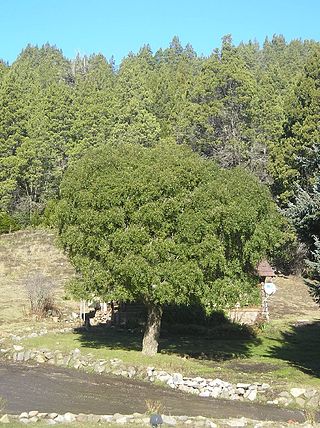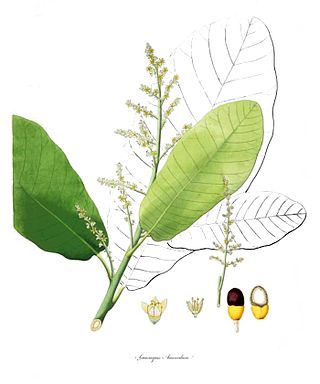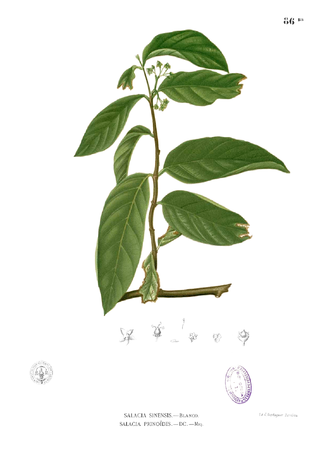
Mangifera is a genus of flowering plants in the cashew family, Anacardiaceae. It contains about 69 species, with the best-known being the common mango. The center of diversity of the genus is in the Malesian ecoregion of Southeast Asia, particularly in Sumatra, Borneo, and the Malay Peninsula. They are generally canopy trees in lowland rainforests, reaching a height of 30–40 m (98–131 ft).

Anisophyllea is a genus of plant in the family Anisophylleaceae. The generic name is from the Greek meaning "unequal leaf", referring to the dimorphism of the leaves.
Cassine viburnifolia is a species of mangrove plant of tropical Asia in the staff vine family Celastraceae. The specific epithet viburnifolia refers to how the plant's leaves resemble those of the genus Viburnum.

Glyptopetalum is a genus of plant in the family Celastraceae.

Lophopetalum is a genus of plants in the family Celastraceae.

Maytenus is a genus of flowering plants in the family Celastraceae. Members of the genus are distributed throughout Central and South America, Southeast Asia, Micronesia, and Australasia, the Indian Ocean and Africa. They grow in a very wide variety of climates, from tropical to subpolar. The traditional circumscription of Maytenus was paraphyletic, so many species have been transferred to Denhamia and Gymnosporia.

Microtropis is a genus of plant in the family Celastraceae. There are about 70 species. They are trees and shrubs, evergreen or deciduous, with oppositely arranged leaves and white or yellowish flowers. Microtropis are distributed in Asia, Africa, and Central America.

Semecarpus is a genus of plants in the family Anacardiaceae. It includes 87 species native to the Indian subcontinent, Indochina, Malesia, Taiwan, Papuasia, Queensland, and the South Pacific.

Swintonia is a genus of plants in the family Anacardiaceae. It includes 13 species native to Bangladesh, eastern India, Indochina, and western Malesia.

Salacia is a genus of plants in the family Celastraceae. They are woody climbers naturally found in tropical regions.

Thottea is a genus of flowering plants in the pipevine family, Aristolochiaceae.
Perrottetia alpestris subsp. philippinensis is a subspecies of Perrottetia alpestris. It is a plant in the family Dipentodontaceae, sometimes classified in the family Celastraceae.

Drimycarpus is a small genus of trees in the cashew and sumac family Anacardiaceae. The generic name is from the Greek meaning "pungent fruit".
Gluta rugulosa is a tree of Borneo in the cashew and sumac family Anacardiaceae. The specific epithet rugulosa is from the Latin meaning "wrinkled", referring to the fruits.
Gluta sabahana is a tree of Borneo in the cashew and sumac family Anacardiaceae. The specific epithet sabahana is from the Latin meaning "of Sabah".

Bhesa indica is a flowering plant tree species in the Centroplacaceae family. It is distributed along the tropical wet evergreen forests of the Western Ghats of India. It is considered synonymous with Bhesa paniculata by some authors.
Kokoona littoralis is a tree in the family Celastraceae. The specific epithet littoralis means "of the seashore".
Kokoona ovatolanceolata is a tree in the family Celastraceae. The specific epithet ovatolanceolata means "egg-shaped tapering to the ends", referring to the shape of the leaves.
Kokoona ochracea is a tree in the family Celastraceae. The specific epithet ochracea means "yellow-brown", referring to the flowers.
Kokoona reflexa is a tree in the family Celastraceae. The specific epithet reflexa means "recurved", referring to the tip of the leaf.












